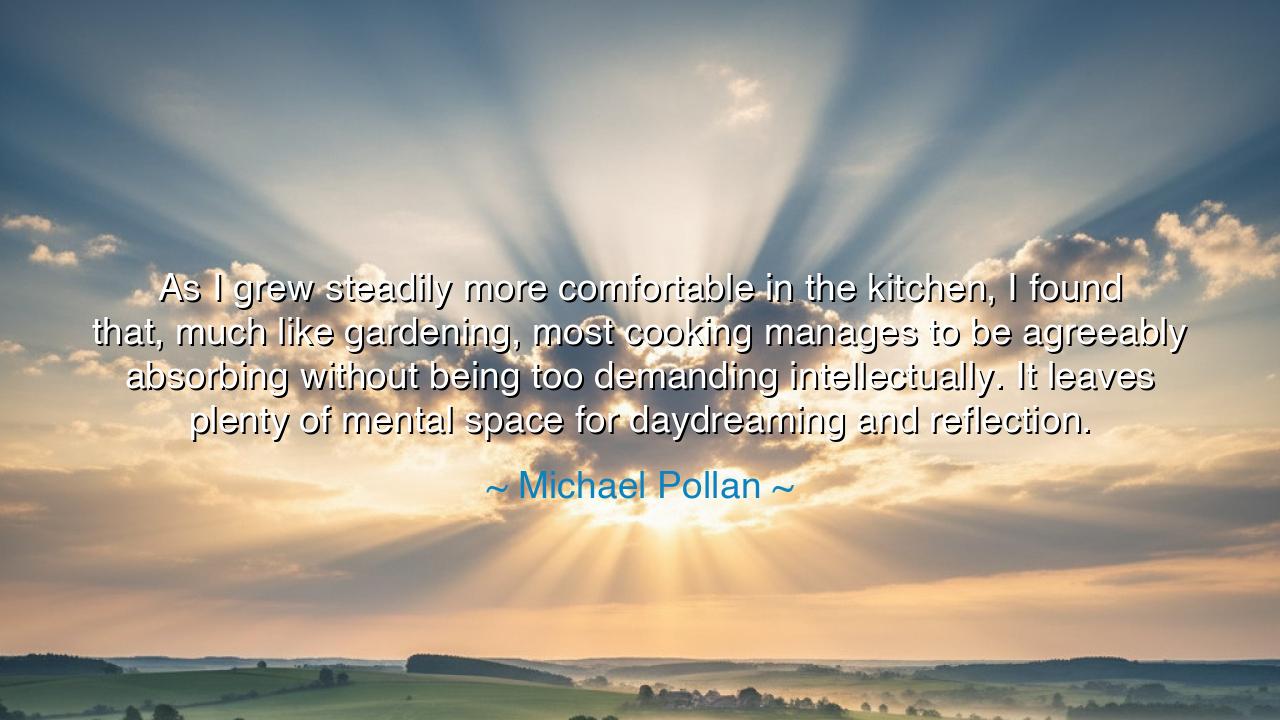
As I grew steadily more comfortable in the kitchen, I found that
As I grew steadily more comfortable in the kitchen, I found that, much like gardening, most cooking manages to be agreeably absorbing without being too demanding intellectually. It leaves plenty of mental space for daydreaming and reflection.






In the sacred art of nourishment, there is a wisdom that speaks through the humble acts of cooking and gardening—two practices that, though seemingly simple, hold within them the power to bring us closer to our deepest selves. Michael Pollan, a man who has spent much of his life observing the connection between food and the human spirit, shares this profound truth: "As I grew steadily more comfortable in the kitchen, I found that, much like gardening, most cooking manages to be agreeably absorbing without being too demanding intellectually. It leaves plenty of mental space for daydreaming and reflection." These words are a gentle reminder that, in a world that often demands too much from us, there are sanctuaries of simplicity that offer us peace, clarity, and a chance to reconnect with our inner thoughts.
What Pollan speaks of is not merely the act of cooking, nor the art of gardening. He speaks of the mental space that opens up when we engage in these acts, when we immerse ourselves in their rhythm, their flow. It is as though the soul, in its quiet yearning for reflection, has found a gentle refuge in these humble tasks. Much like the gardeners of old, who would toil in the soil not just for food, but for spiritual nourishment, so too does the cook find solace in the preparation of a meal. The stirring of a pot, the chopping of vegetables, the simmering of broth—all these actions are, in their own way, meditations. They allow the mind to wander, to drift, and in that wandering, to touch upon the deepest corners of the self.
In the ancient world, cooking was a sacred act, a way to honor the gods and nourish the body and spirit. The great philosopher Aristotle once spoke of the importance of balance in life, a balance that could be found in the simplest of acts. To him, food was not just fuel for the body, but a means of connecting with the rhythms of the earth. A meal prepared with care, he believed, could nourish both body and soul. The same could be said of gardening. When we plant a seed and watch it grow, we are not only engaged in the act of cultivation but are also cultivating our own inner peace, allowing the mind to settle into a place of quiet reflection.
Pollan’s words also echo the sentiments of ancient sages, who understood that thought and action need not always be separate. There is a deep connection between the two, an interweaving of mind and body that is reflected in the practices of cooking and gardening. These tasks, while absorbing, do not demand the intellectual strain that other endeavors might require. Instead, they offer a space where the mind can wander freely, as though in a field of dreams. Here, in this space, we can reflect on the past, contemplate the future, or simply be present in the moment, at peace with the simplicity of the task at hand.
Let us consider the example of Confucius, the wise sage of ancient China, who often spoke of the importance of small, humble tasks in the cultivation of a virtuous life. It is said that when Confucius was not teaching, he would often spend time in the garden, tending to the plants and reflecting on the world around him. He understood that in the quiet moments of gardening and cooking, the mind could find clarity, could touch upon truths that might otherwise remain hidden. These small acts, like Pollan’s reflections on cooking, were opportunities for the mind to rest and rejuvenate, to ponder deeply without the demands of intellectual exertion.
In the modern age, it is easy to become overwhelmed by the constant rush, the noise, and the endless demands placed upon us. But as Pollan reminds us, there are sanctuaries—small, sacred spaces where the mind can find rest, where reflection can happen without the pressure of achieving something grand or profound. The kitchen, like the garden, becomes a place of refuge, a place where we can lose ourselves in the rhythm of chopping, stirring, and simmering, and in so doing, find a way to reconnect with ourselves.
Therefore, take Pollan’s wisdom to heart. In the busyness of life, find your own quiet refuge. Step into the kitchen and embrace the simplicity of cooking, or tend to the garden and listen to the soil, the plants, and the wind. These acts are not mere chores—they are pathways to peace, to reflection, and to a deeper understanding of who you are. Through these humble acts, we find a way to nourish not just the body, but the soul, creating mental space where thoughts can breathe and reflections can flourish. In these small moments, we reconnect with the earth, with the wisdom of the ages, and with ourselves.






AAdministratorAdministrator
Welcome, honored guests. Please leave a comment, we will respond soon